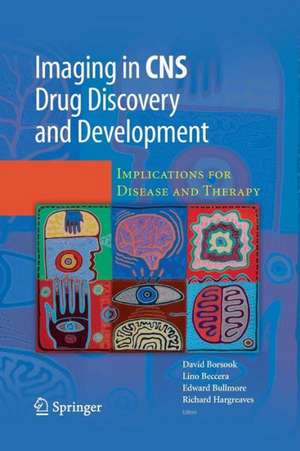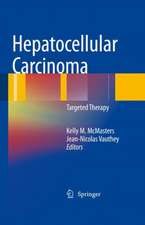Imaging in CNS Drug Discovery and Development: Implications for Disease and Therapy
Editat de David Borsook, Lino R. Beccera, Edward Bullmore, Richard J. Hargreavesen Limba Engleză Paperback – 26 noi 2014
Imaging in CNS Drug Discovery and Development, Implications for Disease and Therapy will serve to distill the most salient developments in the use of imaging in drug development and disease mapping. It will launch evolving concepts that integrate new imaging technologies and paradigms with molecular medicine and molecular profiling ("monics") as well as consider the ethical issues that arise as a result of disease or state diagnosis and the use of imaging in the public eye.
| Toate formatele și edițiile | Preț | Express |
|---|---|---|
| Paperback (1) | 1100.85 lei 6-8 săpt. | |
| Springer – 26 noi 2014 | 1100.85 lei 6-8 săpt. | |
| Hardback (1) | 1105.77 lei 6-8 săpt. | |
| Springer – 10 noi 2009 | 1105.77 lei 6-8 săpt. |
Preț: 1100.85 lei
Preț vechi: 1158.79 lei
-5% Nou
Puncte Express: 1651
Preț estimativ în valută:
210.70€ • 219.14$ • 176.57£
210.70€ • 219.14$ • 176.57£
Carte tipărită la comandă
Livrare economică 14-28 martie
Preluare comenzi: 021 569.72.76
Specificații
ISBN-13: 9781489984746
ISBN-10: 1489984747
Pagini: 416
Ilustrații: XVIII, 396 p.
Dimensiuni: 155 x 235 x 22 mm
Greutate: 0.58 kg
Ediția:2009
Editura: Springer
Colecția Springer
Locul publicării:New York, NY, United States
ISBN-10: 1489984747
Pagini: 416
Ilustrații: XVIII, 396 p.
Dimensiuni: 155 x 235 x 22 mm
Greutate: 0.58 kg
Ediția:2009
Editura: Springer
Colecția Springer
Locul publicării:New York, NY, United States
Public țintă
ResearchCuprins
Background.- The Challenges and Opportunities.- Imaging of CNS Systems: Importance for Drug Development.- Imaging Approaches.- Anatomical Imaging: Volumetric Analysis.- Diffusion Tensor Imaging and Drug Development.- Functional Magnetic Resonance Imaging in Drug Development.- Magnetic Resonance Imaging of Pharmacological Systems.- Molecular Imaging: Basic Approaches.- Chemical Imaging: Magnetic Resonance Spectroscopy: The Basics.- Imaging CNS Drug Action.- Animal Imaging.- Incorporating Functional MRI into Clinical Pharmacology Trials.- Imaging Placebo Responses in the Brain.- Structural Imaging of Drug Actions in Neurodegenerative Diseases.- Molecular Imaging of the CNS: Drug Actions.- Imaging CNS Disease States.- Translational MRI in CNS Drug Discovery.- In Vivo Mouse Imaging and Spectroscopy in Drug Discovery.- Neuroimaging in Understanding Chronic Pain Mechanisms and the Development of New Therapies.- Neuroimaging Human Drug Addiction.- Anxiety: Uncover Roles of Stress Related Genes by Imaging Genetics.- Imaging CNS Disease States: Alzheimer’s Disease.- Brain Development and CNS Plasticity.- Imaging in CNS Disease States: PTSD.- Integrative Processes.- Integrative Processes: Neuroscience Clinical Imaging Biomarkers.- Reasons to Believe: The Potential of Imaging in CNS Drug Development.
Notă biografică
David Borsook, MD, Ph.D., trained in medicine and neurobiology at the University of the Witwatersrand, Medical School, Johannesburg, South Africa. He graduated in 1980. Following his internship he trained in Neurology at Boston City Hospital and then was the first Pain Fellow at the Massachusetts General Hospital, Department of Neurology. He subsequently was the Director of the Pain Center at the Hospital from 1994 – 2004. He has completed doctoral studies in Neurobiology and later started the Pain Imaging Program in the Department of Radiology at Massachusetts General Hospital. In 2002 he led an effort to cofound a Biotech – Descartes Therapeutics Inc, with his colleague Lino Becerra Ph.D. to use imaging in drug development, where he was Senior Vice President and Chief Scientific Officer. He currently directs an integrated imaging program – Pain & Analgesia Imaging Neuroscience (p.a.i.n.) Group at three Harvard Medical School Affiliated Hospitals, Massachusetts General Hospital, McLean Hospital and Children’s Hospital Boston. A component of this is a consortium of pharmaceutical and academic centers involved in the evaluation of fMRI in drug development known as ICD (Imaging Consortium for Drug Development). He has participated in a number of NIH meetings on future directions of pain research. His research is supported by grants from the National Institutes of Health, Foundations and Pharamaceutical Companies interested in the use of imaging in defining pain phenotype. He has published over 85 papers that include various aspects of pain, imaging in pain and analgesia. He is married with sons living in Concord Massachusetts.
Dr. Lino Becerra Ph.D., is Lecturer in Psychiatry at Harvard Medical School, he has co-appointments in the Departments of Psychiatry at McLean Hospital and Massachusetts General Hospital (MGH), and Radiology at MGH. He’s the Director of the Imaging and Analysis Group at theBrain Imaging Center, McLean Hospital; and Co-Director of the Imaging Consortium for Drug Development (ICD) and the Pain Imaging and Analgesics Neuroscience Group (P.A.I.N. Group) at the same institution. Dr. Becerra was a co-founder of Descartes Therapeutics Inc., a biotech company dedicated to the development of drugs for chronic pain patients. Dr. Becerra’s research interests are focused on the optimization of functional imaging for its utilization in drug development, in particular for chronic pain. Dr. Becerra specifically is interested in the translational aspects of drug development through the study of preclinical and clinical early phase trials with the aid of neuroimaging. Dr. Becerra is author of over 50 publications, reviews and book chapters appearing in journals such as Neuron, Neuroscience, Journal of Neuroscience, Journal of Neurophysiology, NeuroImage, and European Journal of Pain. He is a reviewer for these Journals, and also for Biological Psychiatry and Archives of General Psychiatry.
Edward Bullmore, MD, Ph.D., trained in medicine at Oxford and St. Bartholomew's Hospital, London, graduating in 1985. Following a period of further medical training as a Lecturer in Medicine at the University of Hong Kong (MRCP 1989), he started specialist training in psychiatry at St. George's Hospital, London, and then at the Bethlem Royal & Maudsley Hospital as a registrar from 1990 (MRCPsych 1992). From 1993, he was supported by the Wellcome Trust as a Research Training Fellow (then as an Advanced Research Training Fellow 1996-99) at the Institute of Psychiatry in London, where he completed doctoral studies on statistical analysis of magnetic resonance imaging data (PhD 1997). In 1999, he moved to the University of Cambridge as a Professor of Psychiatry and since 2005 he has been Clinical Director of the Behavioural & Clinical Neurosciences Institute atCambridge. Also since 2005, he has combined his academic roles with a 50% secondment to GlaxoSmithKline as Vice-President for Experimental Medicine and head of GSK's Clinical Unit in Cambridge (CUC). His research in Cambridge has been supported by grants from the National Institutes of Health (Human Brain Project), the Wellcome Trust and the MRC; he has published more than 200 papers on various aspects of neuroimaging, neuroscience and psychiatry. In 2008 he was elected a Fellow of the Academy of Medical Sciences. He is married with three sons and enjoys living without a car in central Cambridge.
Richard Hargreaves, Ph. D., trained at Chelsea College, London University in the UK where he obtained a First class honors degree in pharmacology. After completing his doctorate through the Physiology Department at King’s College London University UK, he joined Merck’s Neuroscience Research Center in Harlow UK in 1988 where he occupied positions of increasing seniority. Richard led the discovery biology teams that contributed to the development of MAXALT® (rizatriptan) for the treatment of migraine and EMEND® (aprepitant) and IVEMEND® (fosaprepitant), novel agents that advance the protective pharmacotherapy of acute and delayed chemotherapy-induced nausea and vomiting and post-operative nausea and vomiting. In 1999 Richard moved to the USA to establish and lead a worldwide imaging research strategy for Merck Research Laboratories. Since that time, he built a global multimodality Imaging group that supports decision making in drug discovery and development across Merck's key therapeutic areas. A key component of this imaging strategy has been the use of pre-competitive initiatives to combine expertise and share the costs of developing and characterizing new imaging tools and technologies that can be used to improve the evaluation of the safety and efficacy of novel drug candidates. Richard was awarded the 2007 Gary Neill Award for "Innovationin Drug Development" by the American Society of Clinical Pharmacology and Therapeutics (ASCPT) for his work on imaging in drug discovery and development. In February 2008, he was named Worldwide Head of Basic Research, Neuroscience for Merck Research Laboratories.
Dr. Lino Becerra Ph.D., is Lecturer in Psychiatry at Harvard Medical School, he has co-appointments in the Departments of Psychiatry at McLean Hospital and Massachusetts General Hospital (MGH), and Radiology at MGH. He’s the Director of the Imaging and Analysis Group at theBrain Imaging Center, McLean Hospital; and Co-Director of the Imaging Consortium for Drug Development (ICD) and the Pain Imaging and Analgesics Neuroscience Group (P.A.I.N. Group) at the same institution. Dr. Becerra was a co-founder of Descartes Therapeutics Inc., a biotech company dedicated to the development of drugs for chronic pain patients. Dr. Becerra’s research interests are focused on the optimization of functional imaging for its utilization in drug development, in particular for chronic pain. Dr. Becerra specifically is interested in the translational aspects of drug development through the study of preclinical and clinical early phase trials with the aid of neuroimaging. Dr. Becerra is author of over 50 publications, reviews and book chapters appearing in journals such as Neuron, Neuroscience, Journal of Neuroscience, Journal of Neurophysiology, NeuroImage, and European Journal of Pain. He is a reviewer for these Journals, and also for Biological Psychiatry and Archives of General Psychiatry.
Edward Bullmore, MD, Ph.D., trained in medicine at Oxford and St. Bartholomew's Hospital, London, graduating in 1985. Following a period of further medical training as a Lecturer in Medicine at the University of Hong Kong (MRCP 1989), he started specialist training in psychiatry at St. George's Hospital, London, and then at the Bethlem Royal & Maudsley Hospital as a registrar from 1990 (MRCPsych 1992). From 1993, he was supported by the Wellcome Trust as a Research Training Fellow (then as an Advanced Research Training Fellow 1996-99) at the Institute of Psychiatry in London, where he completed doctoral studies on statistical analysis of magnetic resonance imaging data (PhD 1997). In 1999, he moved to the University of Cambridge as a Professor of Psychiatry and since 2005 he has been Clinical Director of the Behavioural & Clinical Neurosciences Institute atCambridge. Also since 2005, he has combined his academic roles with a 50% secondment to GlaxoSmithKline as Vice-President for Experimental Medicine and head of GSK's Clinical Unit in Cambridge (CUC). His research in Cambridge has been supported by grants from the National Institutes of Health (Human Brain Project), the Wellcome Trust and the MRC; he has published more than 200 papers on various aspects of neuroimaging, neuroscience and psychiatry. In 2008 he was elected a Fellow of the Academy of Medical Sciences. He is married with three sons and enjoys living without a car in central Cambridge.
Richard Hargreaves, Ph. D., trained at Chelsea College, London University in the UK where he obtained a First class honors degree in pharmacology. After completing his doctorate through the Physiology Department at King’s College London University UK, he joined Merck’s Neuroscience Research Center in Harlow UK in 1988 where he occupied positions of increasing seniority. Richard led the discovery biology teams that contributed to the development of MAXALT® (rizatriptan) for the treatment of migraine and EMEND® (aprepitant) and IVEMEND® (fosaprepitant), novel agents that advance the protective pharmacotherapy of acute and delayed chemotherapy-induced nausea and vomiting and post-operative nausea and vomiting. In 1999 Richard moved to the USA to establish and lead a worldwide imaging research strategy for Merck Research Laboratories. Since that time, he built a global multimodality Imaging group that supports decision making in drug discovery and development across Merck's key therapeutic areas. A key component of this imaging strategy has been the use of pre-competitive initiatives to combine expertise and share the costs of developing and characterizing new imaging tools and technologies that can be used to improve the evaluation of the safety and efficacy of novel drug candidates. Richard was awarded the 2007 Gary Neill Award for "Innovationin Drug Development" by the American Society of Clinical Pharmacology and Therapeutics (ASCPT) for his work on imaging in drug discovery and development. In February 2008, he was named Worldwide Head of Basic Research, Neuroscience for Merck Research Laboratories.
Textul de pe ultima copertă
Imaging is a key area of translational research that provides a unique bridge from the laboratory to the clinic as the same techniques and technologies can applied across the various phases of drug development. Neuroimaging is now central to research and drug development in the neurosciences since it can be used to detect the pharmacological and physiological consequences of drug action within the living brain. Today neuroimaging is used primarily as a biomarker to help optimize our decision-making processes. Neuroimaging tools and technologies can be used to select drug candidates, confirm they engage their targets, link occupancy to biology and then, in a translational fashion, be used to help design the best clinical studies that truly test therapeutic hypotheses.
Topics covered include:
Topics covered include:
- The role of imaging in drug development
- Imaging approaches including structural, functional, molecular and chemical imaging
- Imaging drug action including neuroreceptor mapping to examine drug occupancy characteristics, the involvement of specific neurotransmitter systems in CNS diseases and mechanisms of action
- Functional mapping to provide pharmacodynamic evidence of central activity, "CNS fingerprinting" of the neuroanatomy of drug effects and disease drug interactions
- Imaging disease states in preclinical and clinical domains
Caracteristici
Offers the most recent developments in imaging and disease mapping Introduces evolving concepts incorporating new imaging technologies with "monics" Raises ethical issues regarding the use of imaging in the public Includes supplementary material: sn.pub/extras












